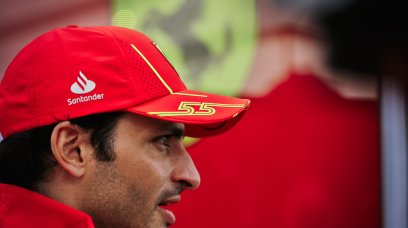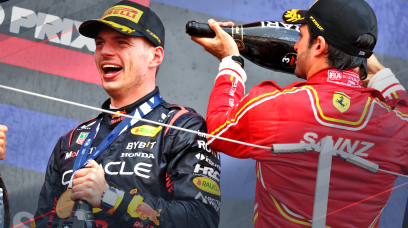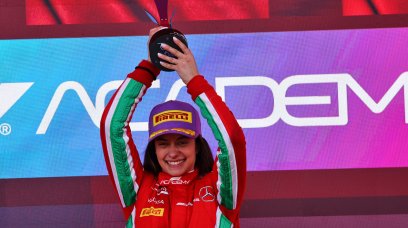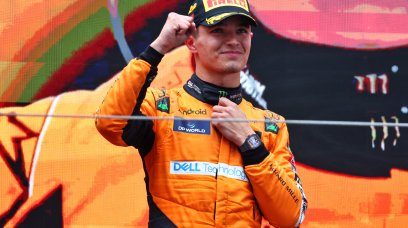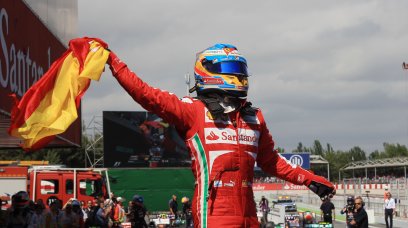Of the 22 drivers who competed in the 2022 F1 season, nine of them have been part of Red Bull-backed teams at some point in their F1 careers. The drinks company is well known for its patronage and sponsorship of motorsport and extreme events, and several promising drivers have enjoyed a leg up into F1 thanks to the firm's support. But who has had the most successful stint under the Red Bull umbrella, and who has been cast aside? RacingNews365.com has trawled through F1's archives to take a look at how successful each driver has been with the backing of the drinks company.
Nyck de Vries
Alright, we're bending the rules a little here, as de Vries hasn't actually raced in F1 under the Red Bull umbrella yet. However, after a stunning F1 debut at the Italian Grand Prix, where he jumped into Alex Albon's Williams at short notice and preceded to finish an amazing ninth, it seemed inevitable that de Vries would be on the grid in 2023. Ultimately, Red Bull won the race for the Dutchman's services, and de Vries will cut his teeth alongside Yuki Tsunoda at AlphaTauri next year. Already a World Champion in Formula E, 27-year-old de Vries finally gets the full-time F1 ride his talent deserves, and if his career trajectory continues on its current path, who'd bet against him joining Verstappen at Red Bull at some point in the future?
Yuki Tsunoda
De Vries' teammate for next year is Japan's Tsunoda, who graduated to F1 with AlphaTauri in 2021 after just two seasons of European-based single seater racing under his belt. While the Japanese has shown a good turn of speed, he has also gained a reputation for being somewhat accident-prone, sliding embarrassingly into the wall in Canada this year, and then colliding with teammate Pierre Gasly at Silverstone. The Japanese can perhaps consider himself a touch fortunate to be remaining with AlphaTauri for a third season, and his drive might have been under more threat had Red Bull's current crop of F2 drivers not largely disappointed in 2022.
Alex Albon
Albon was drafted into Toro Rosso on the eve of the 2019 season after Brendon Hartley had flattered to deceive the previous year. A promising first half-season with the B team brought an unexpected promotion to Red Bull after Pierre Gasly was unceremoniously dropped during the summer break. But like his predecessor, Albon struggled to live up to expectations at Red Bull, taking only two third-place finishes across a season and a half, and he himself was cast aside at the end of 2020, when the form and availability of Sergio Perez made the Mexican impossible to ignore. After sitting on the sidelines during 2021, Albon made it back into F1 with Williams this year, and showed well despite the limitations of his car, rehabilitating himself in the eyes of many who thought his F1 career was over.
Carlos Sainz
In hindsight, Toro Rosso's all-rookie line-up of 2015 must go down as one of F1's most promising ever, with a fresh-faced Carlos Sainz and Max Verstappen teaming up. And though Verstappen inevitably stole the headlines and soon graduated to Red Bull, Sainz proved he was more than deserving of a place in F1 himself. When it became clear that a move to Red Bull was unlikely, Sainz spent a season and a bit on loan at Renault, before moving to McLaren and thence to Ferrari, where he remains to this day, having taken his first Grand Prix win at Silverstone this year. Notably, Sainz was the first Toro Rosso driver to move to another F1 team than Red Bull, proving that a failure to graduate to the senior team need not sound the death knell for one's F1 career. Indeed, given the struggles that Albon and Pierre Gasly endured at Red Bull, perhaps the team should have done more to keep Sainz in the family.
Pierre Gasly
Gasly's initial career path under the Red Bull umbrella was similar to that of Albon: a rookie driver cutting his teeth at Toro Rosso, before being unexpectedly promoted to Red Bull and struggling under the weight of expectation at the senior team, and then losing his drive. In Gasly's case, being cast aside by Red Bull merely spelled a return to Toro Rosso, rather than outright exile from F1, but the Frenchman thrived back at his former team, taking a fairy-tale maiden win at the 2020 Italian Grand Prix, and regularly finishing in the upper points during an impressive 2021 season. Having been passed over for a return to Red Bull in 2020 in favour of Sergio Perez, the writing was perhaps on the wall for Gasly, who seemed to have stagnated somewhat in 2022, and his decision to fly the Red Bull nest to join Alpine for 2023 seems a good outcome for all concerned.
Sergio Perez
Perez is unique on this list as a driver who signed for Red Bull without coming through Toro Rosso/AlphaTauri first – the first to do so since Mark Webber in 2007, before Red Bull's junior programme was as mature as it is today. Red Bull's decision to hire Perez may have been helped by Alex Albon's struggles in 2020, but the Mexican's form and availability that year played a large part in the drinks-backed squad's decision to look outside their driver pool for the first time in 14 years. Though he hasn't shown himself to be quite at Verstappen's level, Perez has generally come closer to the Dutchman than either Gasly or Albon managed, and has taken three Grand Prix wins in races where Verstappen has either been off form or hit trouble. The Mexican has also shown himself to be a good team player in aiding Verstappen's successful title bids in 2021 and 2022, and was rewarded for his efforts earlier this year with a new contract tying him to Red Bull until 2024.
Daniel Ricciardo
When Mark Webber announced he would leave Red Bull and F1 at the end of 2013, the team elected to promote Ricciardo from Toro Rosso in his stead. Despite an unfamiliarity with the higher reaches of the F1 grid, Ricciardo was a revelation in 2014, becoming the only driver other than the dominant Mercedes duo to win a Grand Prix, and soundly thrashing his four-time World Champion teammate Sebastian Vettel, who decamped to Ferrari at the end of the year. Now leading the team, Ricciardo must have been hopeful of mounting a title challenge, but though he took seven wins for Red Bull, he never had the car to truly fight for the championship, and a new threat came in halfway through 2016 with the arrival of Max Verstappen. Notably, Ricciardo was the teammate to have come closest to matching Verstappen's pace – though the Dutchman was perhaps not as complete a driver then than he is today. Perhaps sensing the team was beginning to coalesce around the precocious Verstappen, Ricciardo decided to leave Red Bull for Renault at the end of 2018, before moving to McLaren for 2021. Though he took an emotional win at Monza that year, Ricciardo largely flattered to deceive at Woking, and an overwhelmingly disappointing 2022 saw him released from his contract. Ricciardo rejoins Red Bull as a test and reserve driver for 2023, and though he is not expected to race, it would be a highly emotional return if the Honey Badger does get to sit on the grid for Red Bull once again.
Max Verstappen
Now the reigning two-time World Champion, Verstappen caused a sensation in late 2014 -when he was just 16 years old - with the announcement that he would drive for Toro Rosso in 2015, despite having just one season of single seater racing under his belt. Once in the Toro Rosso cockpit, Verstappen gave the lie to the notion that he was too young and too raw for F1, effortlessly adapting to his new surroundings and scoring 49 points to 18 for teammate Carlos Sainz – himself no slouch. Such was his promise that Red Bull elected to promote him to the senior team four races into 2016, and the Dutchman immediately repaid them with a stunning debut win at just 18 years old. Verstappen soon established himself as team leader, seeing off the threat of Ricciardo, who left for Renault, and thoroughly demoralising his replacements Gasly and Albon. After waiting patiently for Red Bull to provide him with a car capable of maintaining a season-long title battle, Verstappen duly delivered in 2021, besting Lewis Hamilton at the end of a year filled with high drama, tension and controversy. With a debut title under his belt, Verstappen arguably drove even better in 2022, setting new records for race wins and points in a single season as he eased to his second successive crown. But even as he seeks to make it a hat-trick of titles in 2023, the Dutchman cannot yet consider himself Red Bull’s most successful driver of all time…
Sebastian Vettel
That honour belongs instead to Sebastian Vettel, who swept to four straight Championship wins for Red Bull between 2010 and 2013. Joining Toro Rosso in 2007, the young Vettel soon established himself as a star of the future, regularly finishing above quicker cars, and taking an improbable debut win for both himself and the team in damp conditions at Monza in 2008. With David Coulthard retiring, Vettel was a shoo-in at Red Bull in 2009, and took the team's first ever Grand Prix win at the season's third race in China. Having tasted success, Vettel was keen to go even better in 2010, and in one of F1's all-time classic seasons, the German shrugged off some poor reliability to emerge at the head of a five-driver battle for the title with a typically dominant win at the season finale in Abu Dhabi. Three more titles would follow in consecutive years, and though Fernando Alonso put up a fight in 2012, the 2011 and 2013 Championships were won with consummate ease, with pole-to-flag domination becoming depressingly familiar to Vettel's long-suffering rivals. After such sustained dominance, it is perhaps unsurprising that Vettel's star began to wane in 2014, and he duly left Red Bull at the end of that year for a new challenge at Ferrari. But though the German challenged for the title in 2017 and 2018, he would never again repeat the success he had so enjoyed at Red Bull, and a concerning number of unforced errors began to creep into his driving. With his place in Ferrari's affectations seemingly having been taken by Charles Leclerc, Vettel found himself at Aston Martin for 2021, but there was an inescapable sense that the German was not the driver he once was, and it came as little surprise when he announced his retirement at the end of 2022. However, four World Championship titles and 39 wins in Red Bull's colours bear testimony to the fact that Vettel's illustrious F1 career will be best remembered for his many champagne-soaked successes at Milton Keynes.
Most read

